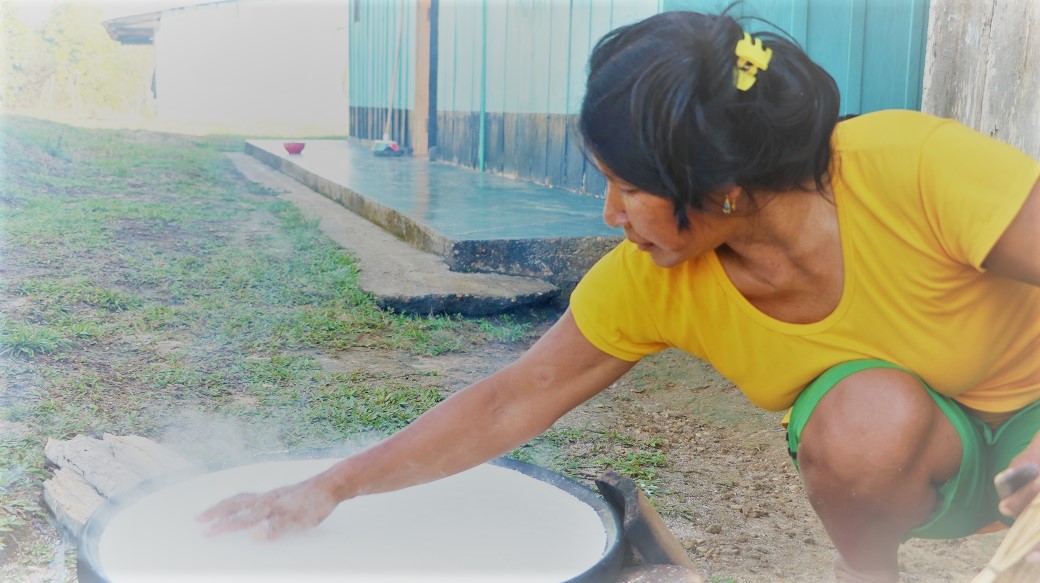Chile 2019: El Derecho de Vivir en Paz (The Right to Live in Peace)

by Eduardo Giesen (Colectivo VientoSur) and Ruth Nyambura (Global Forest Coalition)
On the 18th of October, the largest protests witnessed since the end of the 17-year dictatorship of General Augusto Pinochet began in Chile. The immediate cause of these uprisings was a 3.75% subway fare hike in the capital, Santiago. These protests were in essence a rejection of neoliberalism and privatisation, pervasive subsidies that exist for dirty energy companies and private means of transport (car, air) that are largely accessible to only the middle-class and elite.
Chilean protesters are defending their right to have a well-funded and functioning public transport system and to live lives of dignity. The right-wing government of President Sebastián Piñera responded with a state of emergency, heavily reminiscent of the Pinochet dictatorship. Military agencies and the police were sent to the streets to battle protesters. The emergency has since being revoked but so far 24 people have been killed, more than 200 partially blinded and thousands more injured and arrested. There have also been reports of sexual assaults carried out by the military and police.
Chile was the original home of neoliberal experiments and for long has been the poster child for the so-called successes of neoliberal economic growth. While the country has one of the fastest growing economies in Latin America, its wealth is in the hands of a few. Wealth generation is based largely on easy and fast income from the intense and unsustainable extraction and export of raw materials without added value, complemented by an ultra-liberalised economy, thanks to the compulsive signing of free trade agreements over the last decades. In addition, Chile has the highest rate of income inequality among the OECD group.
In terms of contribution to GDP, forestry is second only to mining in Chile. Due to strong state support for large-scale plantation owners, pine and eucalyptus plantations primarily for the pulp industry now cover over three million hectares of land with just three companies generating over 70% of the industry’s profits. Plantation expansion is considered the main factor driving the loss of native forests and biodiversity in Chile, and these problems are compounded by water scarcity and deepening privatisation of what water resources remain.
Further still, peasant and indigenous communities and the Mapuche (“people of the earth” in Mapudungun) in particular bear the brunt of the industry’s negative impacts as they are displaced from their lands and unable to maintain their traditional economies, ancestral practices and ways of life. Colonialism, the dictatorship and now Chilean state-sponsored neoliberalism have forced the Mapuche into tireless struggle over their land in opposition to the invasion of exotic tree monocultures (and other forms of extractivism) that take away their access to water, healthy soils and traditional health care.
Such wide-spread planting of highly flammable, non-native pine and eucalyptus has seriously exacerbated another threat to communities and forests: fire. In 2017, 600,000 hectares of forests, plantations and agricultural land burned following exceptional temperatures and drought, with 11 people losing their lives, and countless homes and livelihoods destroyed.
Another sector that has benefited hugely from regressive land reform policies and perverse state incentives, and that destroys forests in the process too, is industrial livestock farming for beef and dairy. The industry’s dependence on imported soy-based animal feeds is also responsible for deforestation in neighboring countries where it is grown. The concentration of land into the hands of large-scale producers of beef and milk has squeezed out small producers and peasant farmers, whose traditional practices are far lass damaging to the environment. Despite this, small farms remain essential: more than half of the food consumed domestically is still produced on farms under 20 hectares in size.
The current protests in Chile form part of a wave of new uprisings across Latin America, from Argentina, Ecuador, Honduras and to now in Colombia. A region with the highest economic growth in recent years is also paradoxically the most unequal in the world. The growth rates witnessed across the region, as in Chile, have largely been attributed to various forms of extractivist projects; from industrial agriculture (soy, large-scale meat production) and forestry to mining, and large infrastructure projects like mega hydro-dams and highways. The impacts of these projects on local and indigenous communities across the region has been the destruction of their natural ecosystems with the recent fires in the Amazon revealing the full scale of the crisis.
The levels and nature of human rights abuses perpetuated for the benefit of extractivist actors in the region, often in conjunction with state machinery and corruption, have also increased. A recent report published by Global Witness revealed that more than half (83) of all (164) environmental defenders killed worldwide in 2018 were from Latin America.
While the region is the most dangerous for environmental defenders, Latin American movements in their diversity have largely been uncompromising in their defense of their bodies, territories and social and environmental justice. This has obviously come at a huge cost. In Chile, the systematic persecution and criminalisation of the Mapuche is exemplified by the murder of indigenous activist Camilo Catrillanca, who was shot and killed by police. Elsewhere, the vile assassinations of Honduran environmental defender Berta Caceres as well as Marielle Franco, the black feminist Brazilian politician, have particularly shocked the world.
On the 30th of October, after weeks of protests and defiance by the Chilean people, President Sebatián Piñera announced that his country would no longer host the Asia Pacific Economic Cooperation Summit (APEC) in November or COP25 in December. GFC member group Colectivo VientoSur and one of the People’s Climate Summit (Cumbre de los Pueblos) organising groups, was quick to point out that while Chilean movements regard the cancelling of the neoliberal APEC summit a win, they interpret the cancelling of COP25 as a way for the government to shift the attention away from the atrocities it is committing against the protesters as well as from the structural causes of the protests in the country. There is also the fact that given the current scale of the mobilization, neither of these international meetings would have been possible.
With or without the COP, Chilean social movements are pressing ahead with the Cumbre de los Pueblos, which started yesterday. The Global Forest Coalition is hosting a number of events with our allies at the People’s Summit and Women’s Tent over the next week focusing on women’s rights and gender justice, unsustainable livestock production and false solutions to climate change like tree plantations and bioenergy. If you’re in Santiago, we’d love to see you there!











